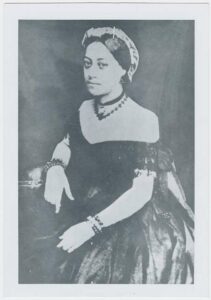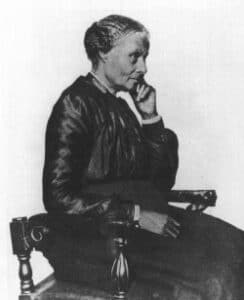In honor of Women’s History Month, Weekly Real Estate News will be sharing impactful stories all month long to shed light on the women in real estate who have helped pave the way for advocacy in homeownership. This week, we will share the story of Mary Ellen Pleasant, the “Mother of Civil Rights.” We will explore Mary Ellen Pleasant’s impact on the real estate and housing world and how her work continues to influence the industry today.

Mary Ellen Pleasant (1814-1904) was a woman of many talents and accomplishments, but her most enduring legacy is as a real estate pioneer. Born into slavery in Philadelphia in 1814, Pleasant became a successful entrepreneur, philanthropist, and civil rights activist. She used her wealth and influence to support causes such as abolitionism, women’s rights, and housing for African Americans.
Early Life and Career
The exact details regarding her birth are widely disputed. Still, the most common theory is that Mary Ellen Pleasant was born in Philadelphia to a father from Hawaii and a free black mother. Her father wanted her to have an education, but he could not find any schools that black girls could attend in Philadelphia. As an importer, he had a network of connections in the Northeast and knew there was a school in Nantucket, Massachusetts, that Mary Ellen could attend. He placed his daughter with the Hussey family, a connection of his who ran a mercantile store on Nantucket Island.
When Mary Ellen was 26, the Husseys arranged for her to live with a bootmaker in Boston, and she became their apprentice. Among the shop’s customers was James W. Smith, a wealthy Cuban. Smith was an ardent abolitionist who attended the church Mary Ellen attended. They eventually married and united in the cause to do away with slavery.
The Smith home was often the meeting spot for James, Mary Ellen, and their friends. Among Smith’s friends were abolitionists William Lloyd Garrison and Wendell Phillips. They often gathered at the Smith home to discuss their ongoing effort to move enslaved people (many of whom were purchased by Smith to set them free) from the South to Canada or other safe places. Unfortunately, Smith’s health took a turn for the worst. Right before his passing, he told Mary Ellen that he would leave her his estate under the condition that she continue their work for abolition.
For help settling the estate, she relied heavily on support from a foreman of Smith’s property, John J. Pleasant. He and Mary Ellen eventually chose to marry.
At the beginning of the 1848 Gold Rush in California, John Pleasant found work as a cook and left for San Francisco. Mary Ellen followed four years later, in 1852, intrigued by stories of women successfully running restaurants and boarding houses in the city. She quickly realized a tremendous demand for domestic workers and set up a successful business as a cook and caterer. She became known for her culinary skills and ability to speak several languages, including French, Spanish, and Chinese.
Real Estate Investments
As Pleasant’s business grew, she began to invest in real estate. She started by buying boarding houses and hotels that catered to African American miners and other workers. She also purchased several plots of land in San Francisco, including a piece of property on Octavia Street that would become her most famous investment.
In 1866, Pleasant purchased the property on Octavia Street for $30,000. At the time, it was a run-down lot with a dilapidated mansion. However, she saw the potential in the property and set about renovating the mansion and turning it into a grand Victorian home.
Pleasant’s Octavia Street property became a hub of African American culture and activism in San Francisco. She hosted political meetings and cultural events, and her home was a gathering place for African American leaders such as Frederick Douglass and John Brown.
She also built several cottage-style houses on the street that she rented out to African American families forced out of other neighborhoods due to discrimination. The homes were designed with features like indoor plumbing and gas lighting, considered rare luxuries then.
Housing Advocacy
In addition to her real estate investments, Pleasant was also a strong advocate for housing rights for African Americans. She knew that housing discrimination was a significant barrier to economic and social equality, and she worked tirelessly to fight against it. She helped to establish the Western Home Association, which provided housing for African American women and children in San Francisco. She also purchased properties in other cities, including Seattle and Vancouver, that she rented out to African American families.
Pleasant’s advocacy for housing rights was not limited to African Americans, however. She also worked to support women’s rights and the rights of other marginalized groups. She established a home for unwed mothers in San Francisco and helped to provide housing for Native Americans who were displaced from their lands.
Pleasant’s impact on Battling Discrimination
Pleasant was known as the “Mother of Civil Rights” in California for her activism and philanthropy. She used her wealth to support abolitionist causes, fund the Underground Railroad, and provide legal support to African Americans fighting for their rights. She was a fighter and did not hesitate to challenge the most influential individuals when she believed her cause was right. She was often quoted saying, “I’d rather be a corpse than a coward.”
She worked as an organizer and protested in the streets against California secessionists. In 1866, Pleasant successfully attacked racial discrimination in San Francisco public transportation after she and two other women were ejected from a city streetcar. She sued the conductor, and the case went to the Supreme California Supreme Court. In a historic decision, the court ruled that segregation on streetcars was illegal in California.

Pleasant’s activism often placed her in danger, and she faced persecution and discrimination for her beliefs. She was known for her sharp wit and quick thinking, which helped her navigate these challenges.
Pleasant’s Legacy in Housing
Pleasant’s success in the real estate industry was notable, particularly given the limitations placed on women and African Americans at the time. She used her wealth and influence to impact the industry and significantly provide housing for marginalized groups.
Mary Ellen Pleasant’s impact on the real estate industry was significant. She achieved success in a sector that white men primarily dominated, and she used her influence to provide housing for marginalized groups and to fight against housing discrimination. Her legacy continues to inspire those working in the real estate industry today, particularly those committed to promoting diversity and inclusion in housing.
Mary Ellen Pleasant’s legacy as a real estate pioneer and housing advocate lives on today. Her Octavia Street property is now a historic landmark, and her contributions to the abolitionist movement and the fight for housing rights are celebrated by historians and activists alike.
Today, Mary Ellen Pleasant is celebrated as influential in civil and women’s rights history. Her legacy continues to inspire and motivate those fighting for social justice. As Annette Gordon-Reed, Pulitzer Prize author of the book “The Hemingses of Monticello: An American Family,” stated, “Mary Ellen Pleasant was a true trailblazer who defied the conventions of her time and fought for what she believed in. Her legacy continues to inspire us today.”

















Inspiring article!
How was she born into slavery if her mother was a free woman and her father Hawaiian?